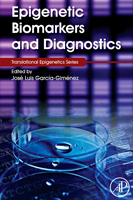Epigenetic Biomarkers and Diagnostics
Edited by: Jose Luis Garcia Gimenez, CIBER Enfermedades Raras, Centre for Biomedical Research on Rare Diseases, University of Valencia, Valencia, Spain

Description
Epigenetic Biomarkers and Diagnostics comprises 32 chapters contributed by leading active researchers in clinical epigenetics. The book is divided into three sections, beginning with the basis of epigenetic mechanisms and descriptions of epigenetic biomarkers that can be used in clinical diagnostics and prognostics.
The second section refers to the importance of the sample quality and ethical issues in clinical epigenetics, with the final section presenting the technologies and methods to discover and analyze epigenetic biomarkers.
The book describes the challenging aspects of epigenetic research and current findings regarding new epigenetic elements and modifiers, providing guidance for researchers interested in the most advanced technologies and methodologies used in the clinical diagnosis or prognosis of disease.
Key Features
- Focuses on recent progress in several areas of epigenetics, general concepts regarding epigenetics, and the future prospects of this discipline in clinical diagnostics and prognostics
- Describes the importance of the quality of samples and clinical associated data, and also the ethical issues for epigenetic diagnostics
- Discusses the advances in epigenomics technologies, including next-generation sequencing based tools and applications
- Expounds on the utility of epigenetic biomarkers for diagnosis and prognosis of several diseases, highlighting the study of these biomarkers in cancer, cardiovascular and metabolic diseases, infertility, and infectious diseases
- Includes a special section that discusses the relevance of biobanks in the maintenance of high quality biosamples and clinical-associated data, and the relevance of the ethical aspects in epigenetic studies
Readership
Specialists in epigenetics, researchers in genetics, biology, physiology, biomedicine, biotechnology, bioinformatics, physicians from diverse specialties (oncology, endocrinology, pediatrics, pathology, andrology, gerontology, nutrition, etc.), biotech companies interested in developing new biomarkers, graduate students new to epigenetics
Table of Contents
Preface
- Epigenetic Biomarkers: New findings, perspectives, and future directions in diagnostics
- The importance of Biobanks in epigenetic studies
- Epigenetic Mechanisms as Key Regulators in Disease. Clinical Implications
- The evolution of new technologies and methods in clinical epigenetics research
- Biomarkers and methodologies for monitoring epigenetic drug effects in cancer
- Genome-wide techniques for the study of clinical epigenetic biomarkers
- Sequenom MassARRAY technology for the analysis of DNA methylation. Clinical applications
- The role of Methylation-specific PCR and associated techniques in clinical diagnostics
- Pyrosequencing and its application in epigenetic clinical diagnostics
- Mass spectrometry for the identification of post-translational modifications in histones and its application in clinical epigenetics
- High-throughput analysis of non-coding RNAs: implications in clinical epigenetics
- Circulating non-coding RNAs as clinical biomarkers
- DNA methylation biomarkers in lung cancer
- DNA methylation alterations as biomarkers for Prostate Cancer
- DNA methylation in breast cancer
- DNA methylation in obesity and associated diseases
- DNA Methylation Biomarkers in Asthma and Allergy
- DNA Methylation in Pregnancy Complications
- Epigenetics in Infectious Diseases
- DNA Methylation in Neurodegenerative Diseases
- The histone code and disease: post-translational modifications as potential prognostic factors for clinical diagnosis
- Histone Post-Translational Modifications and Chromatin Remodelers in Prostate Cancer
- Histone post-translational modifications in breast cancer and their use in clinical diagnosis and prognosis
- Histone variants and post-translational modifications in spermatogenesis and infertility
- Circulating histones and nucleosomes as biomarkers in sepsis and septic shock
- Chromatin landscape and epigenetic signatures in neurological disorders: emerging perspectives for biological and clinical research
- MicroRNAs deregulation in lung cancer and their use as clinical tools
- Circulating Nucleic Acids as Prostate Cancer Biomarkers
- microRNAs in breast cancer and their value as biomarkers
- microRNAs in bone and soft tissue sarcomas and their value as biomarkers
- miRNAs in the pathophysiology of diabetes and their value as biomarkers
Available now at Store.Elsevier.com